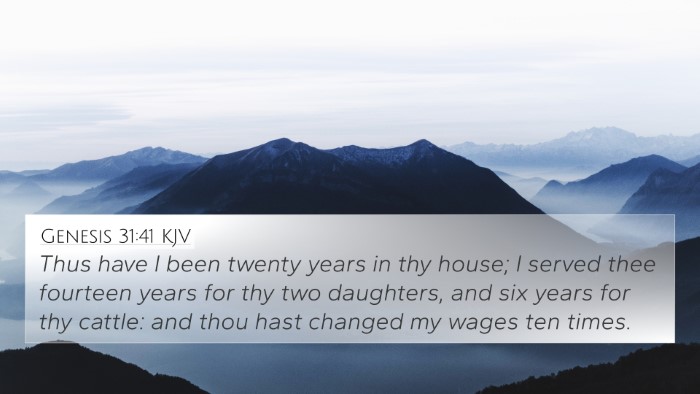Understanding Genesis 31:15
Genesis 31:15 states:
"Are we not counted by him as strangers? For he has sold us, and also completely consumed our money."
Summary of the Verse
This verse captures the sentiments of Leah and Rachel towards their father, Laban. They express feelings of betrayal, emphasizing their status as outsiders in their father's household after he has squandered their rightful inheritance and has treated them with dishonor.
Commentary Insights
Matthew Henry's Commentary
Matthew Henry explains that Rachel and Leah feel alienated from their father Laban, who has not only treated them unjustly but has also misappropriated the wealth that was rightfully theirs. He emphasizes the emotional turmoil of being viewed as strangers and the tension between familial ties and personal grievances.
Albert Barnes' Commentary
Albert Barnes notes the significance of the word "strangers." He elaborates that their mention of being counted as strangers signifies a deeper estrangement borne from Laban's actions. He affirms that the financial exploitation by Laban reflects a broader theme of falling away from one's rightful status and being manipulated by those in authority.
Adam Clarke's Commentary
Adam Clarke highlights the broader implications of the verse regarding Laban's character. He depicts Laban's treatment of Rachel and Leah as emblematic of a parent prioritizing personal gain over family welfare, igniting discussions on themes of loyalty, justice, and familial responsibility. Clarke also underscores the loss of their inheritance and the emotional weight carried by the sisters.
Bible Cross-References
Genesis 31:15 serves as a focal point connecting multiple themes and verses in the Bible. Below are key verses that reflect similar sentiments or provide contrasting perspectives:
- Genesis 29:17 - Discusses the physical attractiveness of Leah and Rachel, contrasting their external appearances with their internal struggles.
- Genesis 30:1-2 - Rachel's deep desire for children, showcasing her emotional confrontation with her status in the family.
- Genesis 31:1 - Rachel and Leah discussing their father's treatment, indicating the brewing discontent before their departure from Laban.
- Exodus 22:21-24 - A law emphasizing the treatment of the vulnerable, aligning with the theme of familial obligation.
- Matthew 6:24 - The call to avoid serving two masters, applicable to Laban's divided loyalties towards wealth over family.
- Proverbs 15:27 - A warning about greed and its implications, resonating with Laban’s actions.
- 1 Timothy 6:10 - Explores the love of money as a root of all evil, providing insight into Laban's character.
Thematic Connections
The themes in Genesis 31:15 trigger reflections on various theological concepts, such as:
- The role of justice in family dynamics
- The consequences of parental betrayal
- Wealth and its moral implications
- Female agency in biblical narratives
Tools for Bible Cross-Referencing
Understanding the connections between verses enhances biblical study. Here are various tools and methods to facilitate cross-referencing:
- Bible Concordance - Use this tool to find related verses easily.
- Bible Cross-Reference Guide - A comprehensive resource that provides thematic links.
- Cross-Reference Bible Study - A method for exploring verse connections systematically.
Interpreting Cross-References
By understanding how Genesis 31:15 connects with other scriptures, one can gain a deeper appreciation of the narratives within the Bible. Questions to consider include:
- What verses are related to Genesis 31:15?
- How do Genesis 31:15 and Matthew 6:24 connect?
- Finding cross-references for Genesis 31:15 in both Old and New Testaments.
Conclusion
Genesis 31:15 is a profound verse that highlights the complexities of familial relationships, justice, and personal agency. Through various commentaries and cross-references, readers can uncover the multilayered meanings behind the passage and appreciate its implications in the broader context of scripture.








